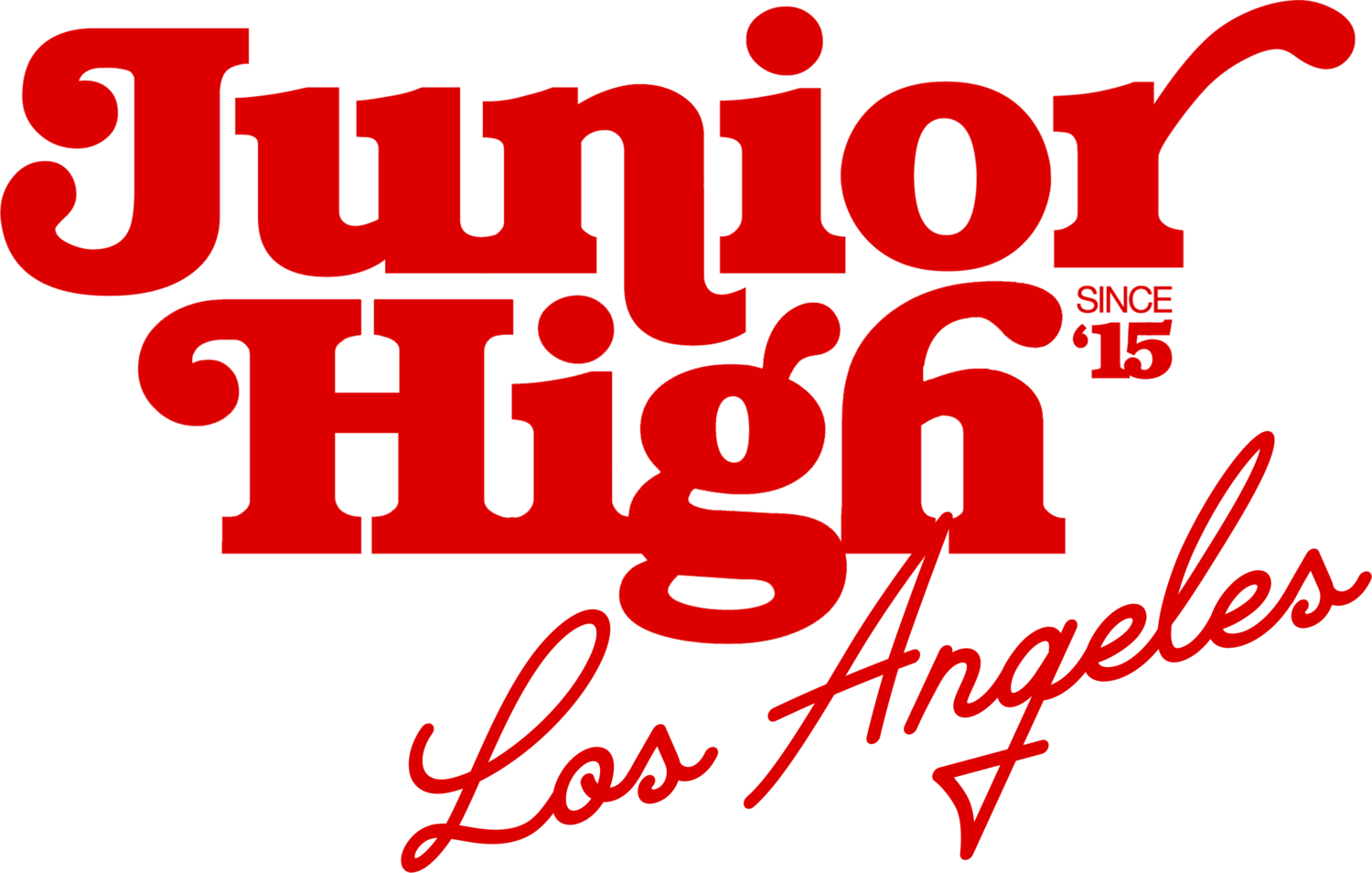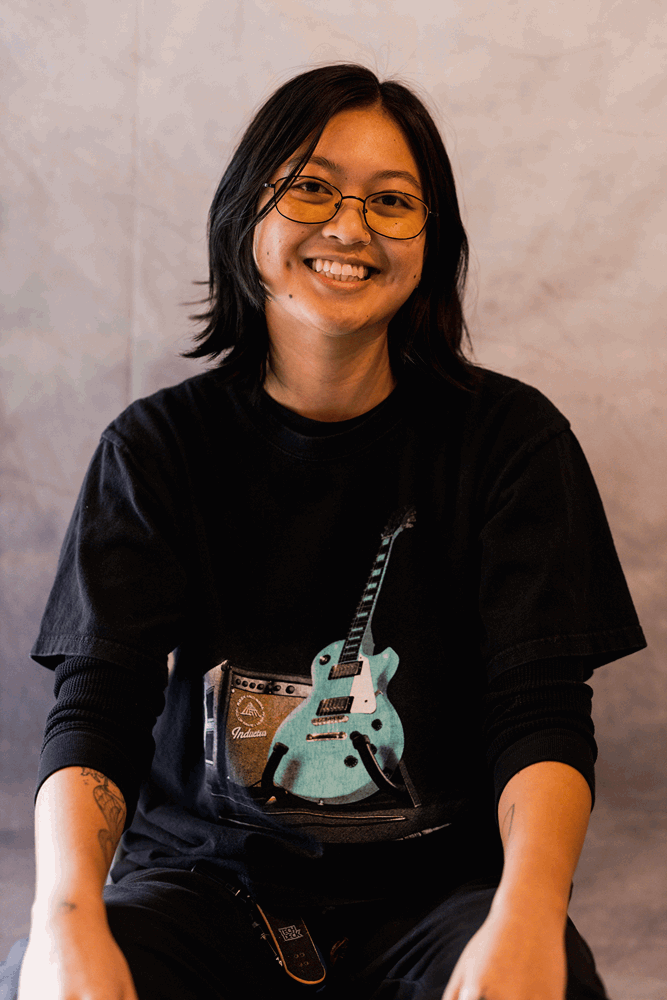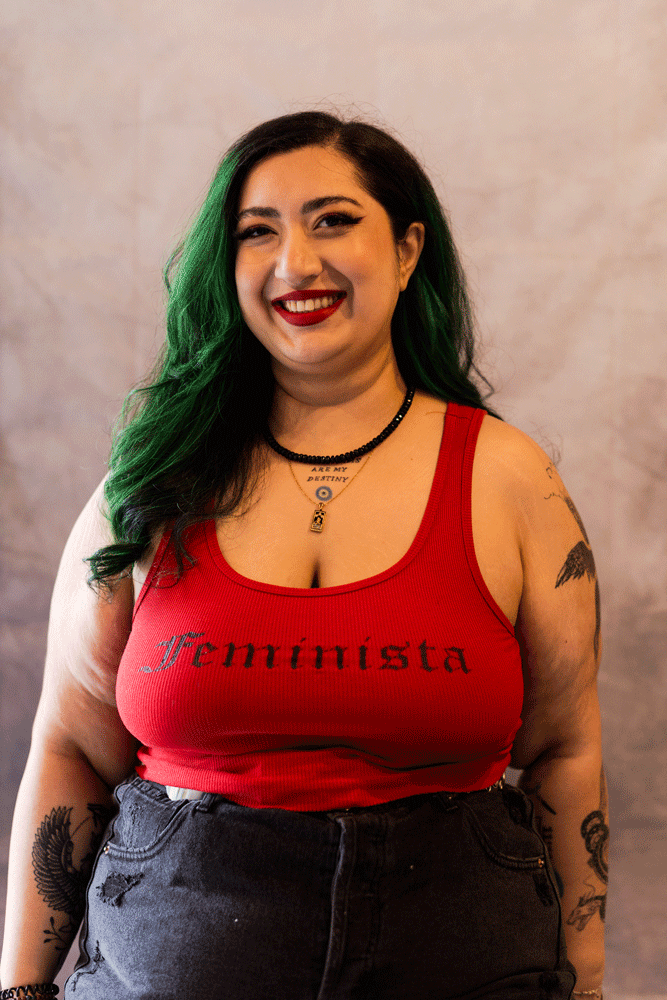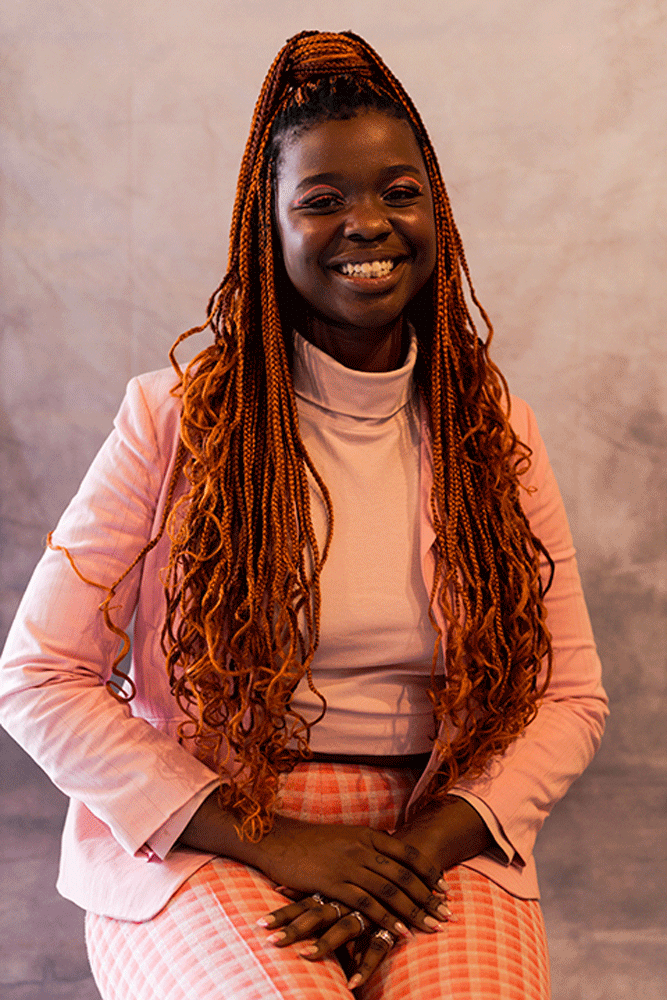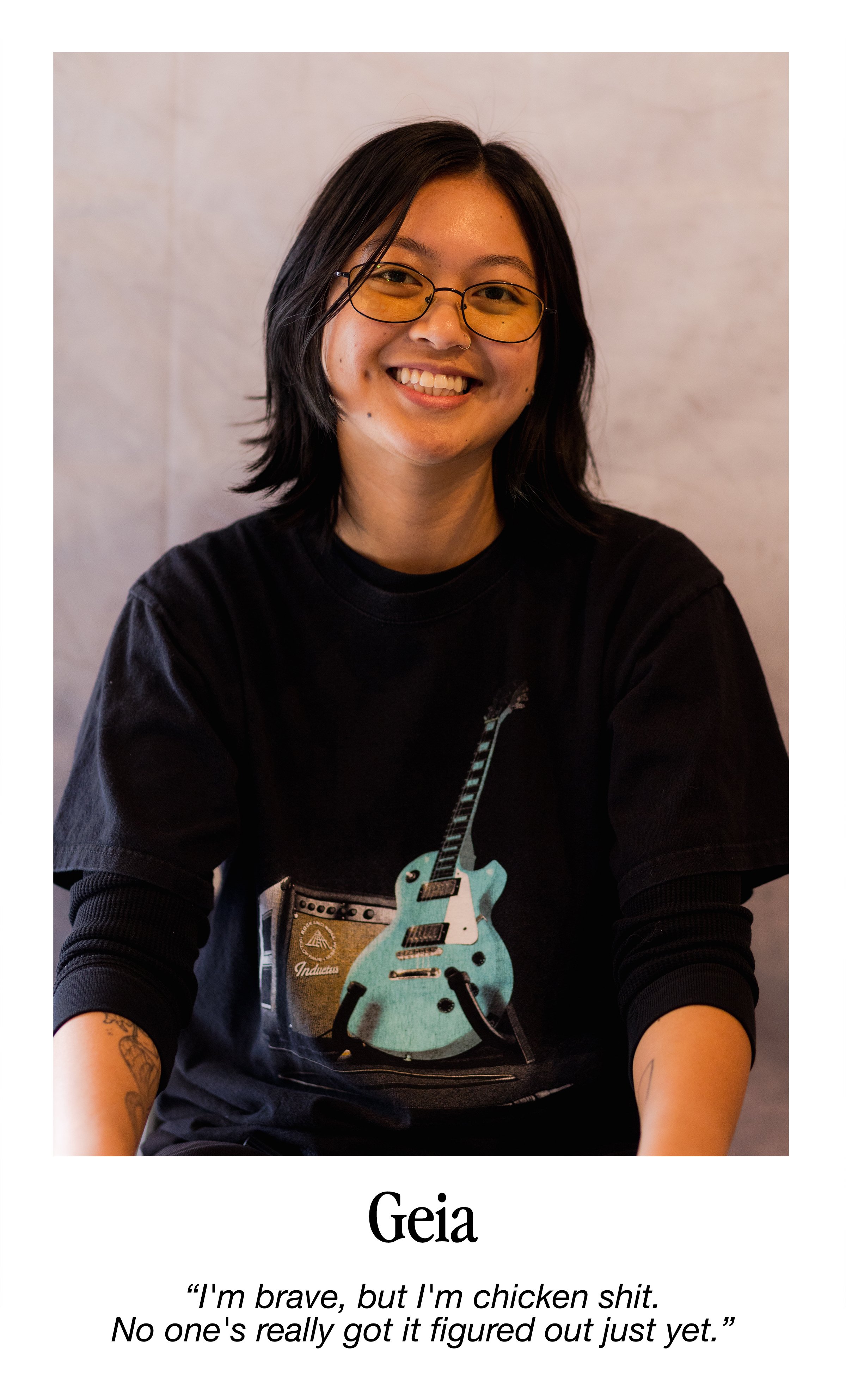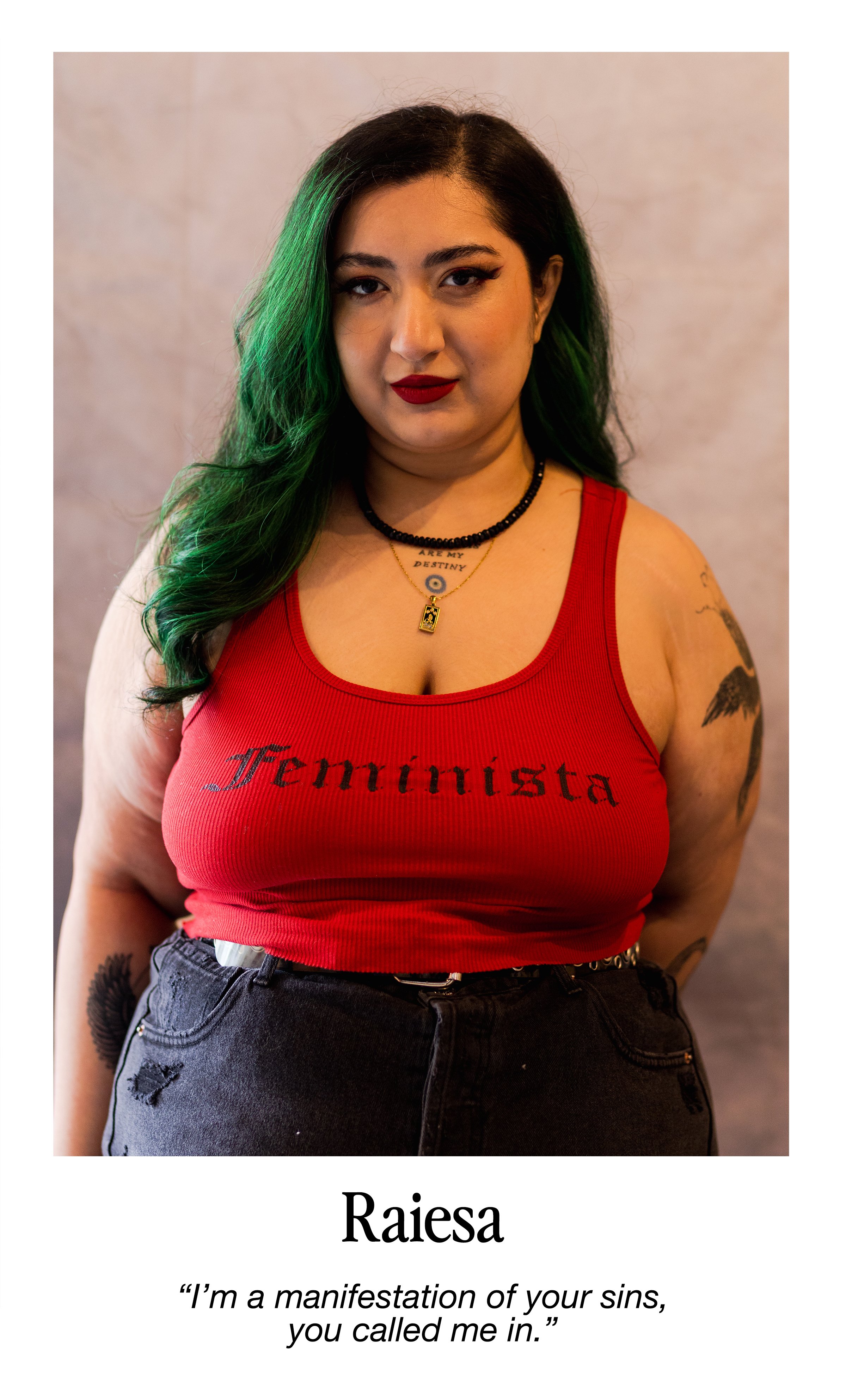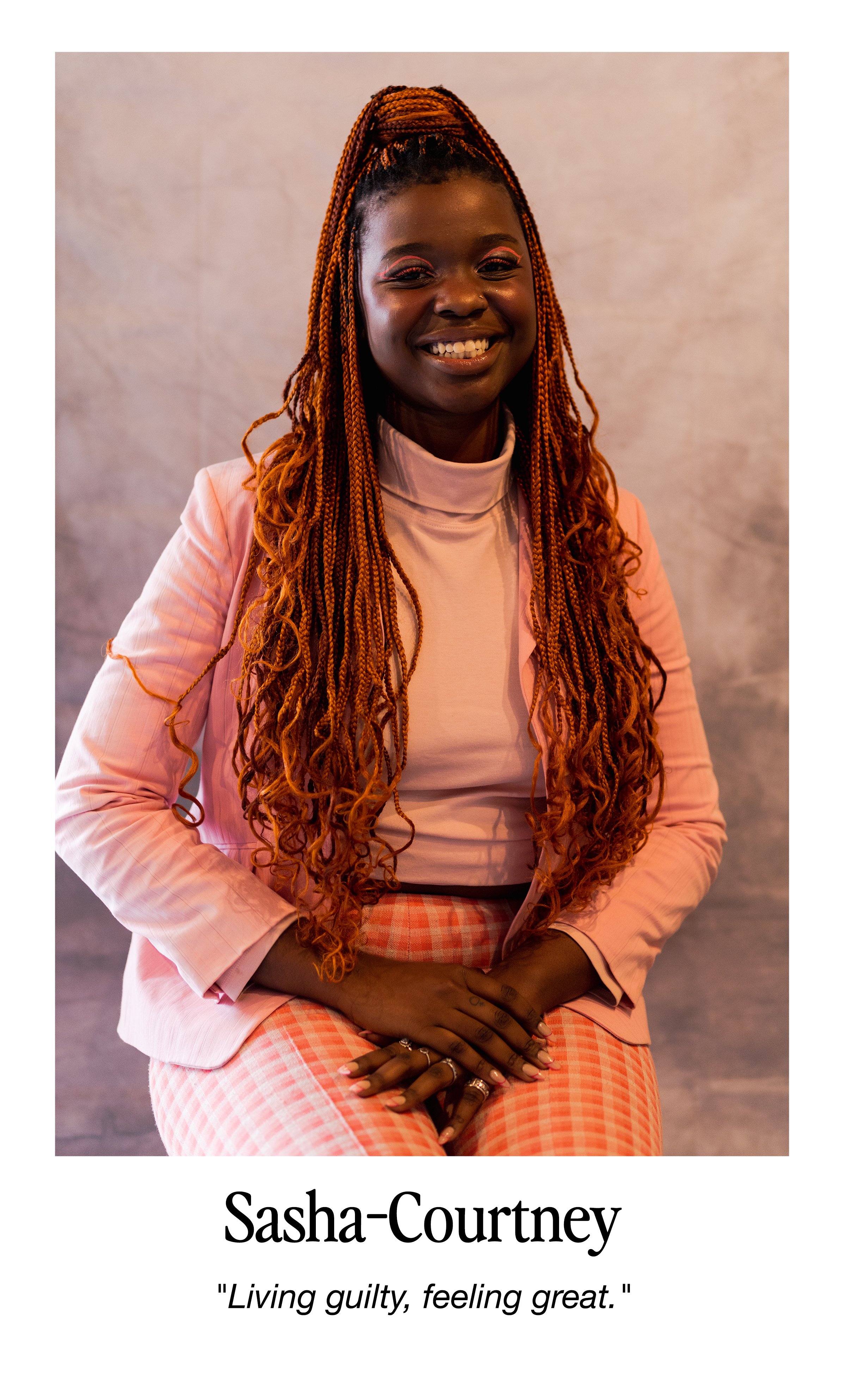Syryn Records Class of ‘23
⤏ THE ARTISTS AND INTERNS OF SYRYN RECORDS ON VISIBILITY, IDENTITY AND THE FUTURE OF THE MUSIC INDUSTRY
⤏ IN CONVERSATION WITH GISSELLE PERNETT
⤏ PHOTOGRAPHY BY JON DEL REAL
Since their launch in 2020, Syryn Records — a youth run record label and internship program— was designed to uplift and empower young girls, women and gender expansive youth entering the music industry. The yearly mentorship program has allowed interns to learn from A&R, marketing, and publicity professionals while supporting a group of young artists and the production of the label’s compilation record. I spoke with Geia Wilkinson, Raiesa Usmani and Sasha-Courtney Hofisi — three of the label’s featured artists — on their individual songwriting processes, isolation and how they’re ready to be the leaders of an inclusive and accessible music industry.
GISSELLE PERNETT: Each of you has a single featured on Syryn Records Vol. 1 Compilation. How did you get started in music?
GEIA WILKINSON: I was really into Disney Channel when I was young, like the Jonas brothers. That's honestly how I got my start. I don't know what exactly piqued my interest but my mom said, when I was three I wanted to learn [how to play] the drums so I know that part of it is innate. The entertainment that I grew up with was very rock oriented too and the stuff my parents listened to definitely influences what I make now.
RAIESA USMANI: I was always a lover of music. My mom is also a singer, but a —I sing around the house— type singer, because we come from a Muslim family and it's not really allowed for women to sing. When I was 16, I became homeless and I didn't know I could sing or If I had any musical talent. All I knew was I loved music. The shelter I was staying at did open mics which was really cool. I decided to do a cover of Nina Simone's, “Don't Let Me Be Misunderstood.” My mentor pulled me aside and he's like, “You can sing. You have to do something with this.” I always tell Syryn when I was younger, I had this vision of an all women, gender expansive record label. I remember telling my mentor [about] this vision and it ended up manifesting. I'm very passionate about Syryn and it's my youth dream to make sure we thrive.
SASHA-CORTNEY HOFISI: I've been singing my whole life. It was really hard for me to pinpoint, [when] I really got into music. In middle school, I was really into musical theater and that developed my passion for the arts in general. Once I picked up my guitar when I was 12, that's when I really decided that I was going to [pursue] music as a career because I was super inspired by the resurgence of early 2000’s punk, and pop punk music. It very much inspired me to finally learn an instrument and create my own sound. It wasn't until I started college four years ago, [where] I decided to start rapping and switch sounds from a more indie rock sound to an R&B, hip hop sound. Those are still some of my current influences and early influences when I think about how I really got into music.
GP: What are everybody’s musical influences or what music are you listening to now?
GW: I don't know if you guys know the band Momma. I believe they're local —I could be completely wrong— but they're so good. Their sound is really reminiscent of 90’s alternative. They’re a female fronted band. I've been really into them lately. Raiesa mentioned Nina Simone, I love Nina Simone but in general it depends on my mood.
SCH: One album that was in my rotation during the majority of this winter was Smino's Luv 4 Rent. Smino is easily one of my favorite artists of the last [couple of] years. I saw him in concert recently for this tour and I really related to a lot of what was talked about on the album.
RU: If you know me you know my obsession with The Weeknd and Lana Del Rey. It's gotten to a point where everywhere I go, The Weeknd plays and I'm like it's a sign. He's from Scarborough, a small part of Toronto. Seeing someone that grew up where I grew up [and] become so big, so fast was extremely inspiring.
GP: In addition to being artists some of you are also interns. Were you always interested in learning about the different realms of the music industry?
RU: I just wanted to know everything because you can't really go into the music industry blindly. Yes, there's a creative part where you make your music, but then there's a business part of it. If you don't know the business part there's a lot of people who will try to take advantage of you. I like to know everything. I like to absorb everything. Being an intern has taught me and helped me a lot.
SCH: Being minority women in general makes you more susceptible to being taken advantage of by the music industry so having that knowledge is super important. I'm super into multidisciplinary arts, like playing with my visuals, directing my own videos and just learning about graphic design. I think because record labels are almost like an in-house artist production factory. It's a really great place for me to absorb the different creative sides of making music and also absorb the more practical sides as well. There is entrepreneurship in working at a label and being a label executive too. That’s where my aspiration comes from as well because you have to picture ideas and see them through.
“When I was younger, I had this vision of an all women, gender expansive record label. I remember telling my mentor [about] this vision and it ended up manifesting. I'm very passionate about Syryn and it's my youth dream to make sure we thrive.”
— Raiesa Usmani
GP: We all know the entertainment industry can be a not so fun place. Why do you think it was important for Syryn Records to be youth run?
SCH: I think especially for women and gender expansive folks it's really important because a lot of things in the independent, DIY artist space are very gatekept. As a young person entering the music industry, it's really important to create those resources for marginalized communities and for communities who don't already have access.
RU: It's very important to have a safe space where youth can come learn without having all the BS from the music industry. I entered the music industry when I was 16, and there were a lot of weird experiences I could have avoided if there was something like Syryn. We do teach the youth about safety and what to look out for in the music industry.
GP: How has working with Syryn Records as an intern, artist or both helped you with your music?
RU: I just wrote a new song and I can't wait to show everyone, but one of the lyrics is “Sweet sirens casting spells.” Being a part of Syryn Records has definitely shown up in my music. I've written —well, released— one song that was written while I was a part of Syryn called “Why Should I?,” it's the song on the compilation. Syryn has this vibe of being angsty and badass so it's definitely helped me channel that energy into my music and that's the direction my EP is going in.
GW: Sasha talked a little bit about this but being a person of color, there weren't a lot of spaces where I felt I could express myself and be accepted for it and being LGBT, it's a weird space to be in sometimes. It's really isolating. Being a musician can be very isolating because you're always in your own world. Syryn Records was a really good opportunity for me to meet people that were like minded. I've met friends through Syryn Records and that’s not something I always had an easy time with.
SCH: I think a huge part of it too is the visibility and creating more visibility for artists like us. For me, [Syryn] has really helped me step up seeing other people who have similar goals as me and do what I want to do. Having guest mentors come in and talk about what their experiences are and seeing their trials and tribulations and seeing that I'm not really alone in what I'm going through definitely has helped me a lot too. Even though there are a lot of obstacles, coming up as an artist doesn't have to be so complicated and I'm not alone in the journey.
GW: Even the band I talked about Momma, for a while I was like, wow, it's so progressive, [seeing] women in bands, but then I realized they're white. That's obviously not their fault but even though we're seeing this progression of representation in the music industry, it still has such a long way to go.
“a lot of things in the independent, DIY artist space are very gatekept. As a young person entering the music industry, it's really important to create those resources for marginalized communities and for communities who don't already have access.”
— Sasha-Courtney Hofisi
GP: We were talking about the compilation album earlier, but I want to hear more about what that process was like and creating the single that went on the album.
RU: I was living in Vancouver, Canada. It's always, always raining and the sun never comes out. If you listen to “Why Should I?,” it's literally [if] the sun doesn't shine, why should I? The song is kind of just about being miserable in a dark place where it rains all the time, and being extremely sexually frustrated. It just came out of me. I think I was just really pissed at this guy [laughs].
GW: I actually made the song before I found out about Syryn Records, but it was similar to Raiesa. I was just really angry. I was so mad at everything the day I wrote it because I was just constantly being told, “Who are you to think you can make it in music?” “It's a one in a million chance, be more realistic with your goals” and especially coming from a Filipino family. [They’re] very traditional. So I was just like, I'm going to do what I know is best for myself. Then I wrote [“All Girls To the Front.”] I don't remember writing most of it. It just spilled out of me and that's when you know it's a good song.
SCH: I had actually made the beat for my song “Guilty” over the summer and I spent a lot of the first half of 2021 really finding my production skills. I wanted to start releasing self-produced music so there's a lot of momentum building for me in that and frustration. Over the last year, I've been really getting into finding my sound. [“Guilty” talks] about some of the stuff we’ve talked about like being a musician and how being an artist can just be super isolating. I've found myself isolating a lot, losing people that I knew for a long time and then suddenly being surrounded by a lot of new people. A huge thing that came with that was kind of having to make sacrifices because certain aspects of my life, like music and school were demanding a lot out of me. As a result, I had to sacrifice friendships and not being fully present in my friendships and [in] my family relationships. “Guilty” came out of a lot of that angst and me recognizing that I do feel bad that I'm not fostering relationships or not really being as present as I should be but knowing that my music career is worth it.
GP: What's something that Syryn Records does that you want to see more music labels incorporate?
RU: Inclusivity, in the sense where I'm not going to hire you just because you have all these accolades. I'm going to give you a chance because you seem like you're really interested in the music industry and I know you can thrive. I feel like a lot of record labels wait until you get to your prime but what Syryn does is we take people from where they're at.
GP: What's something you'd like to see Syryn Records accomplish in the future?
RU: We want to do more shows!
GW: I would like Syryn Records to be at the forefront of the new revolution in music. That's a lot to ask but everything goes in cycles, right? Especially music and there's this resurgence of alternative music coming now and if we're leading that, I wouldn't mind.
